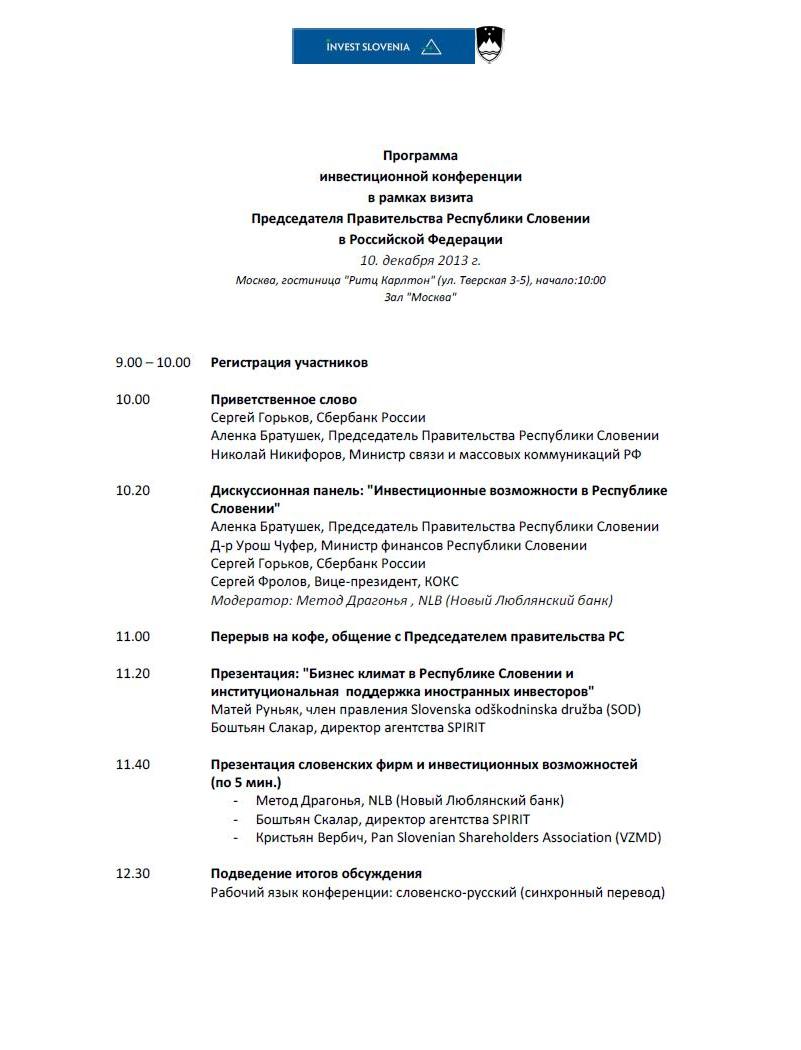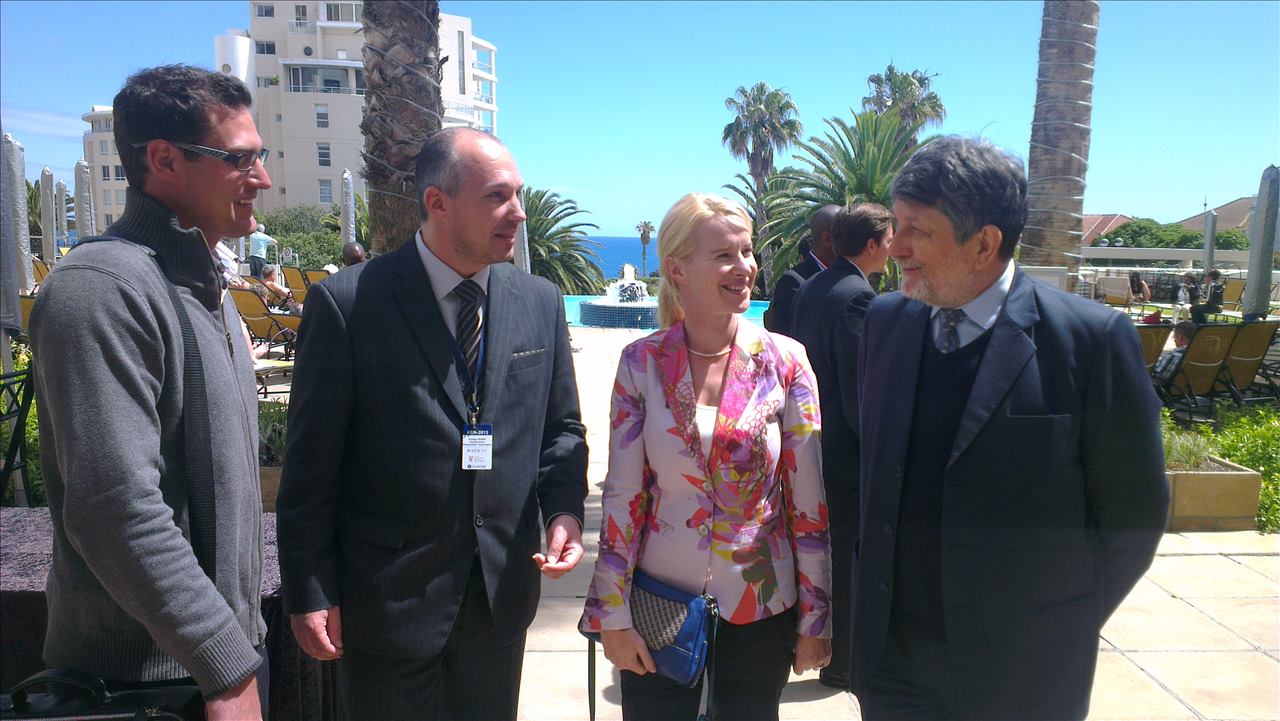 After the active participation at the business conference in the framework of theSlovene business delegation, and after participation at numerous events, meetings and Gourmet Food & Wine Expo, VZMD President Kristjan Verbič, M.Sc., concluded his visit to Canadian Toronto and continued business and private networking in the nearby Buffalo (the USA), from where he yesterday departed for Bucharest, where he is to attend the Economic Forum, alongside the meeting of Middle & Eastern European Prime Ministers and the Chinese Prime Minister.President Verbič was travelling to Bucharest via Istanbul, where he was supposed to attend gala opening of the Turkish-Slovenian Business Club, but the opening has unfortunately been postponed.
After the active participation at the business conference in the framework of theSlovene business delegation, and after participation at numerous events, meetings and Gourmet Food & Wine Expo, VZMD President Kristjan Verbič, M.Sc., concluded his visit to Canadian Toronto and continued business and private networking in the nearby Buffalo (the USA), from where he yesterday departed for Bucharest, where he is to attend the Economic Forum, alongside the meeting of Middle & Eastern European Prime Ministers and the Chinese Prime Minister.President Verbič was travelling to Bucharest via Istanbul, where he was supposed to attend gala opening of the Turkish-Slovenian Business Club, but the opening has unfortunately been postponed.
 Before his departure from Canada VZMD President attended the central event ofBled Mutual Benefit Society, the association of the Slovenians living in Canada with 80 years of tradition, where he addressed more than 200 assembled members of the Slovenian community in Toronto, and exchanged his views with many partners in dialogue. At the initiative of the President of the All-Slovenian Cultural Committee in Toronto Mr. Marjan Kolarič, VZMD President also attended a traditional Victoria Fund charity auction, which is a part of the previously mentioned Cultural Committee (in the photos: the assembled participants in the Great Hall of the Slovene Cultural Centre, next to Mr. Verbič there is Mr. Marjan Kolarič and his predecessor of many years Mr. Stane Kranjc; PHOTO BY: Ciril Soršak).
Before his departure from Canada VZMD President attended the central event ofBled Mutual Benefit Society, the association of the Slovenians living in Canada with 80 years of tradition, where he addressed more than 200 assembled members of the Slovenian community in Toronto, and exchanged his views with many partners in dialogue. At the initiative of the President of the All-Slovenian Cultural Committee in Toronto Mr. Marjan Kolarič, VZMD President also attended a traditional Victoria Fund charity auction, which is a part of the previously mentioned Cultural Committee (in the photos: the assembled participants in the Great Hall of the Slovene Cultural Centre, next to Mr. Verbič there is Mr. Marjan Kolarič and his predecessor of many years Mr. Stane Kranjc; PHOTO BY: Ciril Soršak).
 During his visit to Canada Mr Verbič met numerous representatives and respected members of the Slovenian community, among others Honorary Consul General of the Republic of Slovenia in Canada Mr John Dom, Charge d'affaires ad interim at the Slovenian Embassy in Ottawa Ms Irena Grill, Executive Director of KREK Credit Union Ltd. Mr Joseph Cestnik, Top Grade Molds, Ltd. Executive Director Mr Joe Slobodnik, SKAL International ex-President Mr Frank Vismeg, the representative of Bank of Montreal Ms Sylvia Turk, Kearns Waste Sciences, Ltd. Representative Mr John Ivan Plut, Editor of the Canadian magazine »Glasilo« Ms Milena Soršak, J.M. Die Limited CEO Mr Joe Skof, the owner of a famous boat, anchored in Toronto, and former Jadran restaurant owner Mr John Letnik – Captain John (on the left of the photo), etc.
During his visit to Canada Mr Verbič met numerous representatives and respected members of the Slovenian community, among others Honorary Consul General of the Republic of Slovenia in Canada Mr John Dom, Charge d'affaires ad interim at the Slovenian Embassy in Ottawa Ms Irena Grill, Executive Director of KREK Credit Union Ltd. Mr Joseph Cestnik, Top Grade Molds, Ltd. Executive Director Mr Joe Slobodnik, SKAL International ex-President Mr Frank Vismeg, the representative of Bank of Montreal Ms Sylvia Turk, Kearns Waste Sciences, Ltd. Representative Mr John Ivan Plut, Editor of the Canadian magazine »Glasilo« Ms Milena Soršak, J.M. Die Limited CEO Mr Joe Skof, the owner of a famous boat, anchored in Toronto, and former Jadran restaurant owner Mr John Letnik – Captain John (on the left of the photo), etc.
In the framework of endeavours of the international VZMD business-investment programmes Invest to Slovenia (investo.si) and International Investors` Network (invest-to.net) VZMD President departed from Toronto to the USA, to the nearby Buffalo, where he visited, among other things, the City Hall and the office of the Mayor Byron W. Brown, and this visit took place exactly on the 50th anniversary of the President John F. Kennedy's assassination, which they mark in Buffalo with special attention, since Kennedy visited this city exactly 51 years ago.
 Mr Verbič, M.Sc., had numerous meetings in Buffalo and he also strengthened the contacts he established in July 1993 as the Head of the 1st Slovenian delegation at the Universiade. At the same time he also established many new contacts withimportant people, especially those who are important for the Slovenian wine growers and wine-cellars. Thus he has met, among others, a renowned and awarded wine connoisseur Paula Paradise (on the left of the photo) who was for many years working as a Director of Wine Education for Prime Wine Corp, one of the leading companies in the area of wine trade in the USA; Ms Paradise is planning to open her own wine house and a wine shop in spring 2014. Ms Paradise and Mr Verbič tried a sample of Pullus wine (it has been awarded many times, among others it has been awarded: Gold Decanter Award, London; Gold Wine Awards in China and Hong Kong, Mundus Vini Gold Medal, Germany), which is the Sort of 10 Barrels of Ptuj Wine Cellar, and Ms Paradise, one of the most eminent wine connoisseurs, has praised the wine's exceptional quality, and she also expressed an interest in including Slovenian wines in the wine offer of her own Wine House and Wine Shop.
Mr Verbič, M.Sc., had numerous meetings in Buffalo and he also strengthened the contacts he established in July 1993 as the Head of the 1st Slovenian delegation at the Universiade. At the same time he also established many new contacts withimportant people, especially those who are important for the Slovenian wine growers and wine-cellars. Thus he has met, among others, a renowned and awarded wine connoisseur Paula Paradise (on the left of the photo) who was for many years working as a Director of Wine Education for Prime Wine Corp, one of the leading companies in the area of wine trade in the USA; Ms Paradise is planning to open her own wine house and a wine shop in spring 2014. Ms Paradise and Mr Verbič tried a sample of Pullus wine (it has been awarded many times, among others it has been awarded: Gold Decanter Award, London; Gold Wine Awards in China and Hong Kong, Mundus Vini Gold Medal, Germany), which is the Sort of 10 Barrels of Ptuj Wine Cellar, and Ms Paradise, one of the most eminent wine connoisseurs, has praised the wine's exceptional quality, and she also expressed an interest in including Slovenian wines in the wine offer of her own Wine House and Wine Shop.
 Immediately after returning to Europe VZMD President departed for Bucharest – via Istanbul where he was supposed to attend the postponed opening of the Turkish-Slovenian Business Club yesterday – and today he is to attend the Economic Forum at the Romanian Parliament, alongside the meeting of the Middle & Eastern European Prime Ministers with the Chinese Prime Minister, and on this occasion Mr. Verbič is also going to meet Slovenian Prime Minister Ms Alenka Bratušek, MA. This is his second visit to Bucharest this year, after the World Bank's International Conference where VZMD President participated as the first speaker at the regular session of the meeting.
Immediately after returning to Europe VZMD President departed for Bucharest – via Istanbul where he was supposed to attend the postponed opening of the Turkish-Slovenian Business Club yesterday – and today he is to attend the Economic Forum at the Romanian Parliament, alongside the meeting of the Middle & Eastern European Prime Ministers with the Chinese Prime Minister, and on this occasion Mr. Verbič is also going to meet Slovenian Prime Minister Ms Alenka Bratušek, MA. This is his second visit to Bucharest this year, after the World Bank's International Conference where VZMD President participated as the first speaker at the regular session of the meeting.
Quite a few successful presentations have been carried out this year in Astana, Almaty, Baku, Brussels, Bucharest, Cape Town, Vienna, Kiev, Ljubljana, Madrid, Moscow, New Delhi, Tokyo, Toronto and Zagreb, andat least a few more visitshave been planned for this year which are supposed to take place in Minsk and Moscow, therefore VZMD is pleased to invite all who would like to take part in the activities to contact VZMD investo.si programme coordinator by phone 031 770 771, programme coordinator by phone 031 770 771, or e-mail tratar@investo.si.










 After the gala opening of the Forum on Tuesday and a panel the participants were discussing the themes of infrastructure, agriculture, energy, tourism and information technology and communications.
After the gala opening of the Forum on Tuesday and a panel the participants were discussing the themes of infrastructure, agriculture, energy, tourism and information technology and communications. Suitable provisions have also been made this time to ensure successful presentations of the companies, institutions and investment projects included in the two VZMD international business-investment programmes.
Suitable provisions have also been made this time to ensure successful presentations of the companies, institutions and investment projects included in the two VZMD international business-investment programmes. After the active participation at the business conference in the framework of theSlovene business delegation, and after participation at numerous events, meetings and
After the active participation at the business conference in the framework of theSlovene business delegation, and after participation at numerous events, meetings and  Before his departure from Canada VZMD President attended the central event of
Before his departure from Canada VZMD President attended the central event of During his visit to Canada Mr Verbič met numerous representatives and respected members of the Slovenian community, among others Honorary Consul General of the Republic of Slovenia in Canada Mr John Dom, Charge d'affaires ad interim at the Slovenian Embassy in Ottawa Ms Irena Grill, Executive Director of KREK Credit Union Ltd. Mr Joseph Cestnik, Top Grade Molds, Ltd. Executive Director Mr Joe Slobodnik, SKAL International ex-President Mr Frank Vismeg, the representative of Bank of Montreal Ms Sylvia Turk, Kearns Waste Sciences, Ltd. Representative Mr John Ivan Plut, Editor of the Canadian magazine »Glasilo« Ms Milena Soršak, J.M. Die Limited CEO Mr Joe Skof, the owner of a famous boat, anchored in Toronto, and former Jadran restaurant owner Mr John Letnik – Captain John (on the left of the photo), etc.
During his visit to Canada Mr Verbič met numerous representatives and respected members of the Slovenian community, among others Honorary Consul General of the Republic of Slovenia in Canada Mr John Dom, Charge d'affaires ad interim at the Slovenian Embassy in Ottawa Ms Irena Grill, Executive Director of KREK Credit Union Ltd. Mr Joseph Cestnik, Top Grade Molds, Ltd. Executive Director Mr Joe Slobodnik, SKAL International ex-President Mr Frank Vismeg, the representative of Bank of Montreal Ms Sylvia Turk, Kearns Waste Sciences, Ltd. Representative Mr John Ivan Plut, Editor of the Canadian magazine »Glasilo« Ms Milena Soršak, J.M. Die Limited CEO Mr Joe Skof, the owner of a famous boat, anchored in Toronto, and former Jadran restaurant owner Mr John Letnik – Captain John (on the left of the photo), etc. Immediately after returning to Europe VZMD President departed for Bucharest – via Istanbul where he was supposed to attend the postponed opening of the Turkish-Slovenian Business Club yesterday – and today he is to attend the Economic Forum at the Romanian Parliament, alongside the meeting of the Middle & Eastern European Prime Ministers with the Chinese Prime Minister, and on this occasion Mr. Verbič is also going to meet Slovenian Prime Minister Ms Alenka Bratušek, MA. This is his second visit to Bucharest this year, after the
Immediately after returning to Europe VZMD President departed for Bucharest – via Istanbul where he was supposed to attend the postponed opening of the Turkish-Slovenian Business Club yesterday – and today he is to attend the Economic Forum at the Romanian Parliament, alongside the meeting of the Middle & Eastern European Prime Ministers with the Chinese Prime Minister, and on this occasion Mr. Verbič is also going to meet Slovenian Prime Minister Ms Alenka Bratušek, MA. This is his second visit to Bucharest this year, after the  Mr. Kristjan Verbič, M.Sc., the President of VZMD (Pan-Slovenian Shareholders' Association) has been, as an active member of the Slovene business delegation, visiting Toronto since Wednesday, in the framework of the efforts of (
Mr. Kristjan Verbič, M.Sc., the President of VZMD (Pan-Slovenian Shareholders' Association) has been, as an active member of the Slovene business delegation, visiting Toronto since Wednesday, in the framework of the efforts of (

 This year's
This year's  After last week's gala dinner in Schönbrunn Palace on Thursday, which took place after the General Assembly of the European Federation of Financial Services Users (
After last week's gala dinner in Schönbrunn Palace on Thursday, which took place after the General Assembly of the European Federation of Financial Services Users (






